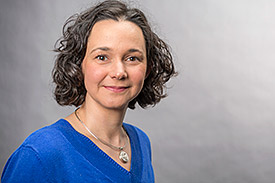Press release from 28 May 2015
Humboldt Professorship for UFZ and MLU: Tiffany Knight bolsters biodiversity research
Leipzig/Halle. The Helmholtz Centre for Environmental Research (UFZ) and the Martin Luther University Halle-Wittenberg (MLU) were successful in their nomination for Germany’s most highly endowed research award, the Alexander von Humboldt Professorship. Tiffany Knight, a US-American from Washington University in St. Louis, is set to strengthen biodiversity research in Central Germany. The Humboldt Foundation will provide five million euros in funding over five years. The appointment will take place on 1 September 2015.
Prof. Tiffany Knight will join the Department of Community Ecology at UFZ. At the same time she will join the Institute of Biology at MLU where she will set up a new professorship for “Spatial Interaction Ecology”. She will also become a member of the German Centre for Integrative Biodiversity Research (iDiv) Halle-Jena-Leipzig.
MLU’s rector, Prof. Udo Sträter, and the scientific director of UFZ, Prof. Georg Teutsch, are both in agreement. “Winning the Humboldt Professorship for Tiffany Knight is a great success for the joint strategy of our two research institutions, both of which are steadily developing extremely successful biodiversity research in the Halle/Leipzig region on an international scale.”
The entire region of Central Germany is now known for biodiversity research throughout the world. The University of Halle and UFZ constitute an important research hub and form part of an excellent scientific landscape that is interconnected on a regional, national and international level. Cooperation with universities in Jena and Leipzig has resulted in numerous large-scale research projects that are funded by the German Research Foundation DFG. iDiv, whose headquarters are in Leipzig, has been the partnership’s biggest success.
Tiffany Knight, who was born in 1975, is currently an associate professor at Washington University in St. Louis, Missouri, USA and has been a guest researcher at iDiv in recent months. She is one of
the world’s most renowned scientists in the area of biological invasions and biodiversity synthesis, which works with large quantities of data. In particular, she studies interactions between plants,
microorganisms, pollinators and herbivores. In the course of her work she combines different methodologies and theoretical approaches that are used, for instance, in population biology and evolutionary
research. Knight’s research is characterised by the fact that she investigates interactions across various ecosystems and spatial scales. Her work on the impact of biological invasions on native
biodiversity is highly recognised. Her overview analyses, which have integrated numerous species and various ecosystems, have contributed to our understanding of the rarity of species on a global scale and are considered milestones in biodiversity research.
Further information about research funding through the Humboldt Foundation can be found at: www.humboldt-foundation.de
Manuela Bank-Zillmann, Susanne Hufe
Further information:
Dr. Stefan Klotz
Helmholtz Centre for Environmental Research (UFZ)
Head of the Department of Community Ecology
Phone +49 345 5585 302
stefan.klotz@ufz.de
Prof. Dr. Helge Bruelheide
Martin Luther University Halle-Wittenberg
Institute of Biology
Phone +49 345 55 26222
helge.bruelheide@botanik.uni-halle.de
or
Tilo Arnhold, Susanne Hufe (Public relations office UFZ)
Phone +49 341 235 -1635, -1630
Manuela Bank-Zillmann (press office MLU)
phone: +49 (0) 345 55 21004
presse@uni-halle.de
In the Helmholtz Centre for Environmental Research (UFZ), scientists conduct research into the causes and consequences of far-reaching environmental changes. Their areas of study cover water resources, biodiversity, the consequences of climate change and possible adaptation strategies, environmental technologies and biotechnologies, bio-energy, the effects of chemicals in the environment and the way they influence health, modelling and social-scientific issues. Its guiding principle: Our research contributes to the sustainable use of natural resources and helps to provide long-term protection for these vital assets in the face of global change. The UFZ employs more than 1,100 staff at its sites in Leipzig, Halle and Magdeburg. It is funded by the federal government, Saxony and Saxony-Anhalt.
The Helmholtz Association contributes to solving major and urgent issues in society, science and industry through scientific excellence in six research areas: Energy, earth and environment, health, key technologies, structure of matter as well as avia-tion, aerospace and transportation. The Helmholtz Association is the largest scientific organisation in Germany, with 35,000 employees in 18 research centres and an an-nual budget of around €3.8 billion. Its work is carried out in the tradition of the great natural scientist Hermann von Helmholtz (1821-1894).

